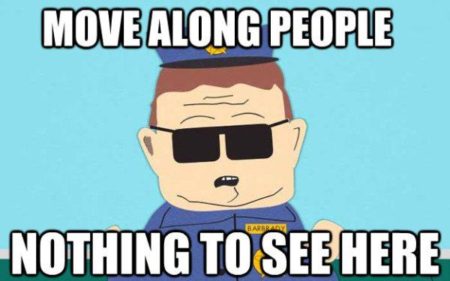After Peter’s second sermon the movement has increased to about 5,000 people! (Acts 4:4) The Jewish religious authorities are alarmed, and arrest Peter and John. The next day, they’re questioned. The leadership demands to know:
“By what power or by what name did you do this?”
Then Peter, filled with the Holy Spirit, said to them, “Rulers of the people and elders, if we are questioned today because of a good deed done to someone who was sick and are asked how this man has been healed, let it be known to all of you, and to all the people of Israel, that this man is standing before you in good health by the name of Jesus Christ of Nazareth, whom you crucified, whom God raised from the dead. This Jesus is ‘the stone that was rejected by you, the builders; it has become the cornerstone.’ [Psalm 118:22, cf. Isaiah 24:15, Matthew 21:42] There is salvation in no one else, for there is no other name under heaven given among mortals by which we must be saved.”
 The leadership wasn’t expecting this message, and doesn’t know what to say, because the healed man is standing right there! But they don’t want this movement to spread – obviously, the majority of them don’t believe that Jesus is the Messiah – so they call Peter and John back in, and order them to desist teaching in the name of Jesus.
The leadership wasn’t expecting this message, and doesn’t know what to say, because the healed man is standing right there! But they don’t want this movement to spread – obviously, the majority of them don’t believe that Jesus is the Messiah – so they call Peter and John back in, and order them to desist teaching in the name of Jesus.
But Peter and John answered them, “Whether it is right in God’s sight to listen to you rather than to God, you must judge; for we cannot keep from speaking about what we have seen and heard.”
I would guess that really, this is Peter talking for both of them; he’s typically the boldest disciple. Surely they’re not talking in unison. Their answer is: sorry, we can’t obey you, because that’d be disobeying God, the God who raised Jesus, the God whose Messiah Jesus was proved to be. Peter and John possess overwhelming, empirical evidence of this. Remember, they saw, heard, and possibly touched the risen Jesus. And they have also seen, felt, and heard the effects of Jesus pouring out God’s spirit on the disciples, as he’d previously promised to do.
The Jewish leadership can’t see how they can punish the two, despite this impunity, so they let them go. End scene.
 This is not really a full sermon, but rather a testimony to Jesus in a tense, formal situation. Peter’s not going for the win here (conversion). So this speech adds nothing to our list of points which must be believed to be saved.
This is not really a full sermon, but rather a testimony to Jesus in a tense, formal situation. Peter’s not going for the win here (conversion). So this speech adds nothing to our list of points which must be believed to be saved.
Peter does here assert that Jesus is in some sense uniquely the way to salvation, and that even though most of his people reject him, God is making Jesus a sort of foundation for his new work. But these things are said (by Luke) to teach the reader, and (by Peter) to rebuke or pronounce judgment on his fellow Jews who rejected Jesus, and perhaps to invite them, in light of this fulfilled prophecy, to reconsider their rejection. But Luke doesn’t present them here as things which must be believed in order to be saved. We’re still working, then, with this list:
- The man Jesus is the one God’s Messiah.
- According to God’s plan, Jesus was unjustly crucified by the Romans.
- But God has vindicated him as his true Messiah by raising him from the dead.
- And God has exalted Jesus to his right hand, making him not only Messiah, but also “Lord,” in fulfillment of prophecy.
- At some future date God will send Jesus back to earth to literally rule it.
- God has given Jesus his spirit, which Jesus has now poured out on believers.
- If you repent of your sins, agree to the above, and are baptized into Jesus, you’ll be forgiven, and you too will get the power of God’s spirit.
